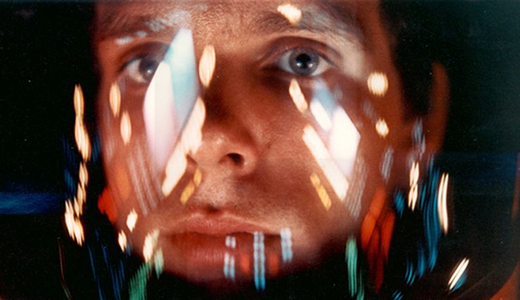About this time in 1968, Stanley Kubrick released a little ol’ movie called 2001: A Space Odyssey, making it one of the few movies older than I am. But despite being made in an ancient era when Apples were fruits, not phones, the film got a lot right about the future. And, well, quite a bit wrong, too.
Tech guru Stephen Wolfram unpacks what the movie got right and wrong about our future in Wired (in lengthy detail). Kubrick’s seminal film nailed, for instance, our ubiquitous use of screens, but was a bit too optimistic about interplanetary travel. And while Wolfram says that the film was prescient about modern tech in plenty of ways, he notes that the folks who built that technology were deeply influenced by, well, 2001.
Thankfully, our computers are not explicitly murdering anyone (yet), which is good, since the Japanese are relying on robots to care for their elderly. But at least HAL 9000 had the decency to say, “I’m sorry, Dave, I can’t do that,” when asked to open the pod bay doors. Today’s binary bad guys simply hand all of our personal information over to total strangers without a word.
Well, not all of our personal information, of course. But Facebook continues to wring its virtual hands in the wake of the Cambridge Analytical data leak scandal. It’s trying to shore up its image as best it can, limiting ad targeting and polling its users regarding whether the service is “good for the world.”
But looking at the stories surrounding the social media company these days, and you’d figure the answer would be a resounding no. ABC News is telling folks how to tell if Facebook has their call history. Writing for The New York Times, Noam Cohen suggests that Facebook is not only abusing a “personal relationship” with it and its users, but a “civic relationship,” as well. The Times also wonders if social media itself can be saved—illustrating the piece with a sinking ship festooned with sails bearing the logos of Facebook, Twitter, Instagram and Snapchat. And at least one Facebook investor is telling its founder, Mark Zuckerberg, to step down.
Yes, Facebook sinned against us. Perhaps if this controversy took place in biblical times, we’d be warming up for a good old-fashioned stoning. And unlike then, a good 8% of us would feel fully capable of picking up the first stone. According to a new study by Lifeway Research, only 67% of us—barely two-thirds—believe we’re sinners. In addition to the 8% who feel like they don’t sin at all, another 10% don’t believe that sin is a real thing. And 15% would just rather not answer the question.
Don’t know whether anyone got a primer on sin through NBC’s live rendition of Jesus Christ Superstar on Easter, but lots of people watched it. The special, starring John Legend, torched ABC’s American Idol revival, which, unfortunately for ABC, isn’t actually that hard to do. Some folks (well, mainly the news hawks over at Fox) are wondering whether Idol’s days are numbered.
Some of Superstar’s stars chatted with The New York Times about their own personal faith, too. Most seem to profess a generic “spiritual, not religious” brand of faith. But Alice Cooper—the rocker who named himself after a witch who was burned at the stake—says that he turned his life around via Christianity.
“I study the Bible every morning,” he tells the Times. “When I’m at home I have a Wednesday morning men’s Bible study. I pray before every show. I go to church every Sunday with my wife and kids. I don’t think I’ve ever been more happy in my life. People say, ‘Think of all you gave up to be a Christian.’ What did I give up? Dying of alcoholism? I’m not giving anything up. I’m giving it back, to him.”
However many watched Jesus Christ Superstar, it’s not nearly as many as tuned in to watch Roseanne. I know we talked about the show’s eye-popping numbers last week. But when factoring in a record number of time-shifting viewers, Nielsen tells us that about 25 million people wound up watching the premiere. Some folks suggest that Roseanne’s success can be attributed to an underserved blue-collar audience, and a few viewers say the show’s conservative slant may be an argument to bring back other right-leaning shows, such as Last Man Standing.
Are teens watching Roseanne? We have no hard data on that here at Culture Clips. But we suspect it would be hard for them to find the time, what with all the hours they’re playing video games to make money, stuffing liquid marijuana in their e-cigarettes and, um, snorting condoms. But the good news is that they’re not being bullied quite as much as they once were.
Finally, a bit of good news from the entertainment world—good news for Waco, Texas, at least. While the town has never exactly been a tourist magnet, that’s apparently changing, thanks to HGTV’s now newly departed show, Fixer Upper. The program, starring Chip and Joanna Gaines, draws people to Waco from across the country. In fact, it’s now No. 2 on TripAdvisors’ “top destinations on the rise.” “We are actually a destination site now,” realtor Trish Griffin told Curbed. “We actually have people moving here because of the show.”
Regular viewers always knew the Gaines’ could fix up a house pretty well. But a whole city? Now they’re just showing off.






Recent Comments